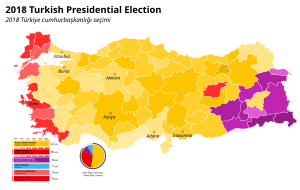
Back الانتخابات الرئاسية التركية 2018 Arabic تورکیه ۲۰۱۸ جومهور باشقانلیغی سئچیمی AZB Прэзідэнцкія выбары ў Турцыі (2018) Byelorussian Президентски избори в Турция (2018) Bulgarian Präsidentschaftswahl in der Türkei 2018 German Elecciones presidenciales de Turquía de 2018 Spanish Turkin presidentinvaalit 2018 Finnish Élection présidentielle turque de 2018 French साँचा:Turkish presidential election, 2018 Hindi თურქეთის საპრეზიდენტო არჩევნები (2018) Georgian
| |||||||||||||||||||||||||||||||||||||||||
| Opinion polls | |||||||||||||||||||||||||||||||||||||||||
| Turnout | 86.24% ( | ||||||||||||||||||||||||||||||||||||||||
|---|---|---|---|---|---|---|---|---|---|---|---|---|---|---|---|---|---|---|---|---|---|---|---|---|---|---|---|---|---|---|---|---|---|---|---|---|---|---|---|---|---|
| |||||||||||||||||||||||||||||||||||||||||
 Results by province | |||||||||||||||||||||||||||||||||||||||||
| |||||||||||||||||||||||||||||||||||||||||
Presidential elections were held in Turkey on 24 June 2018 as part of the 2018 general election, alongside parliamentary elections on the same day. They were the first presidential elections held after constitutional amendments were approved in a 2017 referendum.[2]
The elections were originally scheduled for November 2019. President Erdoğan and MHP Chairman Bahçeli called for early elections, giving as reason to "not wait any longer" for the entry into force of the 2017 constitutional amendments.[3] Following this, with the 2018 elections, the office of prime minister was abolished and the first government under the presidential system took office.
Incumbent President Erdoğan declared his candidacy for the People's Alliance on 27 April 2018. The main opposition, the Republican People's Party, nominated Muharrem İnce, a member of parliament known for his combative opposition and spirited speeches against Erdoğan.[4] The Peoples' Democratic Party nominated Selahattin Demirtaş, its imprisoned former chairman. Besides these candidates, Meral Akşener, the founder and leader of the İyi Party,[5] Temel Karamollaoğlu, the leader of the Felicity Party, and Doğu Perinçek, the leader of the Patriotic Party, announced their candidacies and collected the 100,000 signatures required to stand.
Campaigning centred mainly on the faltering economy and the currency and debt crisis, with both government and opposition commentators warning of a more serious economic crisis following the elections. The 2018 Gaza border protests, following the United States recognition of Jerusalem as capital of Israel, along with the Turkish military operation in Afrin, also featured in the campaign.
- ^ "Jailed leader of Turkey's pro-Kurdish opposition makes first court appearance in 14 months". Reuters. 12 January 2018. Retrieved 7 May 2018.
- ^ Cite error: The named reference
Guardianwas invoked but never defined (see the help page). - ^ "Erdoğan erken seçim tarihini açıkladı". www.cumhuriyet.com.tr (in Turkish). 18 April 2018. Retrieved 11 March 2023.
- ^ "Turkey's main opposition nominates combative former teacher to challenge Erdogan". Reuters. 4 May 2018. Retrieved 6 May 2018.
- ^ Cite error: The named reference
ntvwas invoked but never defined (see the help page).
Cite error: There are <ref group=lower-alpha> tags or {{efn}} templates on this page, but the references will not show without a {{reflist|group=lower-alpha}} template or {{notelist}} template (see the help page).



